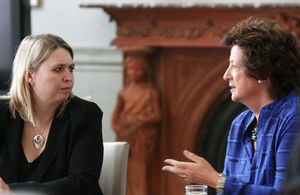Foreign Office hosts Anti Slavery Day event
Foreign Office Minister Baroness Anelay and Home Office Minister for Modern Slavery and Organised Crime, Karen Bradley, mark Anti Slavery Day.

Earlier this year the UK introduced a Modern Slavery Bill to Parliament. The Bill is one of the first in the world specifically tackling modern slavery and reflects the UK’s determination to play a leading role. It will give law enforcement the tools they need to target today’s slave drivers and traffickers, ensure perpetrators are severely punished and improve support and protection for victims. The Bill also includes a legal duty that will require big business to disclose each year the steps they have taken to ensure that modern slavery does not take place in their supply chains. The new legislation is one element of the Government’s comprehensive programme to tackle modern slavery, which includes a national public awareness raising campaign.
The UK Human Trafficking Centre estimated that in 2013 more than 2,700 people, including over 600 children, were potential victims of trafficking for exploitation in the UK alone. Individuals from 112 different countries were referred to support services. These statistics illustrate the importance of raising awareness of the wide ranging nature of this problem. Ministers set out the UK’s approach and underlined the need to continue our collaborative work with international partners to successfully tackle this crime.
The event at the Foreign Office was attended by representatives of High Commissions and Embassies from over 20 countries including Albania, Cameroon and the Philippines. A representative from the NSPCC’s Child Trafficking Advice Centre discussed the issue from the perspective of a child victim whilst an official from the National Crime Agency’s UK Human Trafficking Centre gave an overview of the National Referral Mechanism.
Speaking at the opening of the event Foreign & Commonwealth Office Minister for Human Rights and Migration, Baroness Anelay said:
The sheer scale of the task before us means that we have to continually find ways to disrupt, outmanoeuvre and arrest the despicable criminals who profit from enslaving people.
Clearly, no single country can do this alone. Modern slavery is a truly global issue that cannot be eradicated without a global and collaborative approach.
So, we will continue to build international cooperation and support each other in taking action against human traffickers wherever they are.
Minister for Modern Slavery and Organised Crime, Karen Bradley said:
Modern slavery is global problem that requires action at local, national and international level.
In addition to strengthening our response within Britain, which includes world leading legislation, we are working closely with other countries to prevent further men, women and children being forced or tricked into a life of slavery in the first place. At the same time we are stepping up protection at the border by deploying specialist safeguarding and trafficking teams at major airports to identify and support potential victims.
In December we are hosting the first Santa Marta conference in London which will bring together senior law enforcement chiefs from around the world. The conference will promote the better sharing of intelligence and coordination of the international effort to target the organised crime gangs behind the majority of slavery and trafficking.
Further information
-
Follow Foreign Office Minister Baroness Anelay on Twitter @JoyceAnelay
-
Follow the Foreign Office on Twitter @foreignoffice